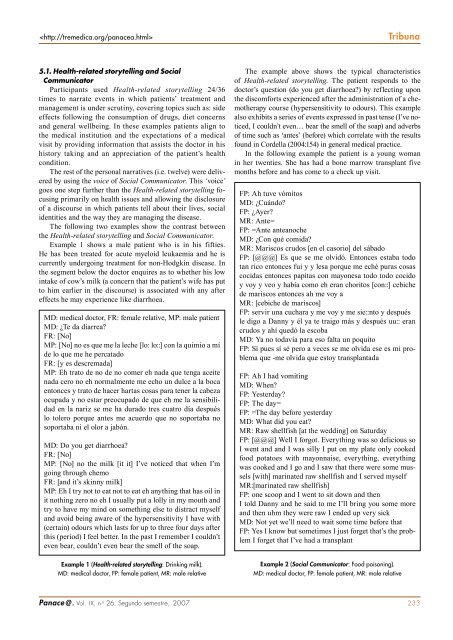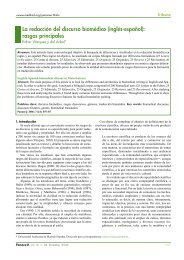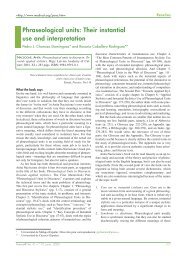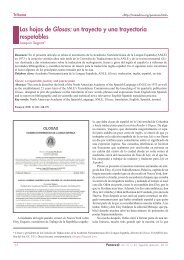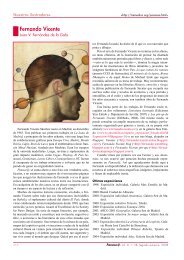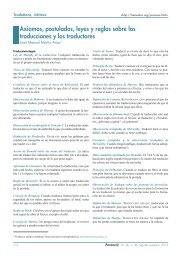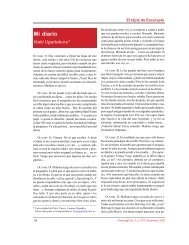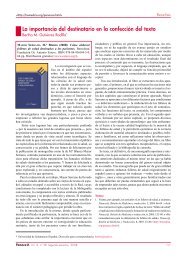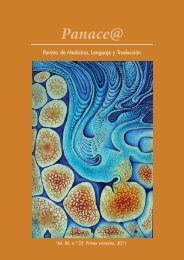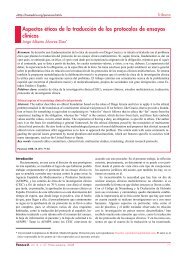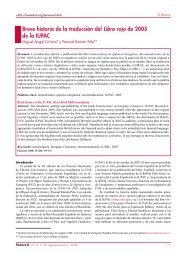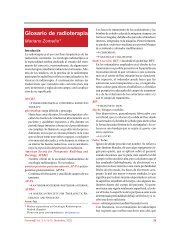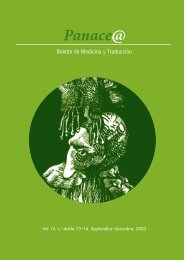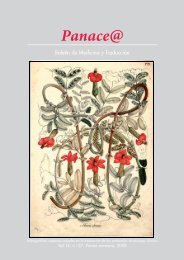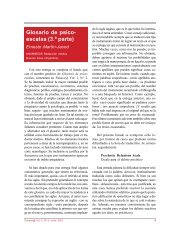Panace@ 26. Diciembre del 2007 - Tremédica
Panace@ 26. Diciembre del 2007 - Tremédica
Panace@ 26. Diciembre del 2007 - Tremédica
You also want an ePaper? Increase the reach of your titles
YUMPU automatically turns print PDFs into web optimized ePapers that Google loves.
Tribuna<br />
5.1. Health-related storytelling and Social<br />
Communicator<br />
Participants used Health-related storytelling 24/36<br />
times to narrate events in which patients’ treatment and<br />
management is under scrutiny, covering topics such as: side<br />
effects following the consumption of drugs, diet concerns<br />
and general wellbeing. In these examples patients align to<br />
the medical institution and the expectations of a medical<br />
visit by providing information that assists the doctor in his<br />
history taking and an appreciation of the patient’s health<br />
condition.<br />
The rest of the personal narratives (i.e. twelve) were <strong>del</strong>ivered<br />
by using the voice of Social Communicator. This ‘voice’<br />
goes one step further than the Health-related storytelling focusing<br />
primarily on health issues and allowing the disclosure<br />
of a discourse in which patients tell about their lives, social<br />
identities and the way they are managing the disease.<br />
The following two examples show the contrast between<br />
the Health-related storytelling and Social Communicator.<br />
Example 1 shows a male patient who is in his fifties.<br />
He has been treated for acute myeloid leukaemia and he is<br />
currently undergoing treatment for non-Hodgkin disease. In<br />
the segment below the doctor enquires as to whether his low<br />
intake of cow’s milk (a concern that the patient’s wife has put<br />
to him earlier in the discourse) is associated with any after<br />
effects he may experience like diarrhoea.<br />
MD: medical doctor, FR: female relative, MP: male patient<br />
MD: ¿Te da diarrea?<br />
FR: [No]<br />
MP: [No] no es que me la leche [lo: lo::] con la quimio a mí<br />
de lo que me he percatado<br />
FR: [y es descremada]<br />
MP: Eh trato de no de no comer eh nada que tenga aceite<br />
nada cero no eh normalmente me echo un dulce a la boca<br />
entonces y trato de hacer hartas cosas para tener la cabeza<br />
ocupada y no estar preocupado de que eh me la sensibilidad<br />
en la nariz se me ha durado tres cuatro día después<br />
lo tolero porque antes me acuerdo que no soportaba no<br />
soportaba ni el olor a jabón.<br />
MD: Do you get diarrhoea?<br />
FR: [No]<br />
MP: [No] no the milk [it it] I’ve noticed that when I’m<br />
going through chemo<br />
FR: [and it’s skinny milk]<br />
MP: Eh I try not to eat not to eat eh anything that has oil in<br />
it nothing zero no eh I usually put a lolly in my mouth and<br />
try to have my mind on something else to distract myself<br />
and avoid being aware of the hypersensitivity I have with<br />
(certain) odours which lasts for up to three four days after<br />
this (period) I feel better. In the past I remember I couldn’t<br />
even bear, couldn’t even bear the smell of the soap.<br />
The example above shows the typical characteristics<br />
of Health-related storytelling. The patient responds to the<br />
doctor’s question (do you get diarrhoea?) by reflecting upon<br />
the discomforts experienced after the administration of a chemotherapy<br />
course (hypersensitivity to odours). This example<br />
also exhibits a series of events expressed in past tense (I’ve noticed,<br />
I couldn’t even… bear the smell of the soap) and adverbs<br />
of time such as ‘antes’ (before) which correlate with the results<br />
found in Cor<strong>del</strong>la (2004:154) in general medical practice.<br />
In the following example the patient is a young woman<br />
in her twenties. She has had a bone marrow transplant five<br />
months before and has come to a check up visit.<br />
FP: Ah tuve vómitos<br />
MD: ¿Cuándo?<br />
FP: ¿Ayer?<br />
MR: Ante=<br />
FP: =Ante anteanoche<br />
MD: ¿Con qué comida?<br />
MR: Mariscos crudos [en el casorio] <strong>del</strong> sábado<br />
FP: [@@@] Es que se me olvidó. Entonces estaba todo<br />
tan rico entonces fui y y lesa porque me eché puras cosas<br />
cocidas entonces papitas con mayonesa todo todo cocido<br />
y voy y veo y había como eh eran choritos [con::] cebiche<br />
de mariscos entonces ah me voy a<br />
MR: [cebiche de mariscos]<br />
FP: servir una cuchara y me voy y me sie::nto y después<br />
le digo a Danny y él ya te traigo más y después uu:: eran<br />
crudos y ahí quedó la escoba<br />
MD: Ya no todavía para eso falta un poquito<br />
FP: Sí pues sí sé pero a veces se me olvida ese es mi problema<br />
que -me olvida que estoy transplantada<br />
FP: Ah I had vomiting<br />
MD: When?<br />
FP: Yesterday?<br />
FP: The day=<br />
FP: =The day before yesterday<br />
MD: What did you eat?<br />
MR: Raw shellfish [at the wedding] on Saturday<br />
FP: [@@@] Well I forgot. Everything was so <strong>del</strong>icious so<br />
I went and and I was silly I put on my plate only cooked<br />
food potatoes with mayonnaise, everything, everything<br />
was cooked and I go and I saw that there were some mussels<br />
[with] marinated raw shellfish and I served myself<br />
MR:[marinated raw shellfish]<br />
FP: one scoop and I went to sit down and then<br />
I told Danny and he said to me I’ll bring you some more<br />
and then uhm they were raw I ended up very sick<br />
MD: Not yet we’ll need to wait some time before that<br />
FP: Yes I know but sometimes I just forget that’s the problem<br />
I forget that I’ve had a transplant<br />
Example 1 (Health-related storytelling: Drinking milk).<br />
MD: medical doctor, FP: female patient, MR: male relative<br />
Example 2 (Social Communicator: Food poisoning).<br />
MD: medical doctor, FP: female patient, MR: male relative<br />
<strong>Panace@</strong>. Vol. IX, n .o <strong>26.</strong> Segundo semestre, <strong>2007</strong> 233


